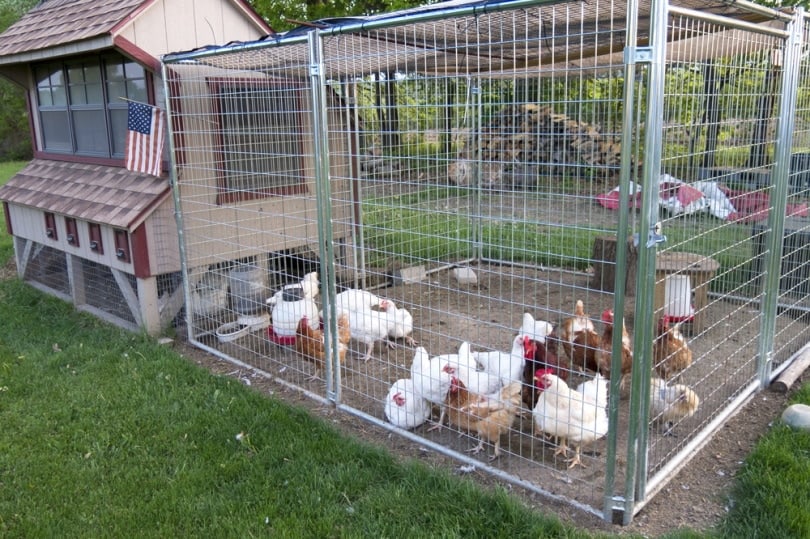Salmonella is often mentioned in conjunction with raw poultry and eggs. It’s part of the warning to remind us to wash our hands after handling raw food and to wipe down any surfaces that the food touches.
Not only can you get salmonella from chicken, but many people also don’t realize that live birds can carry the bacteria too. This includes the chickens in your backyard. For this reason, we put together this guide to teach you about the risks and help you protect your family from infection.

What Is Salmonella?
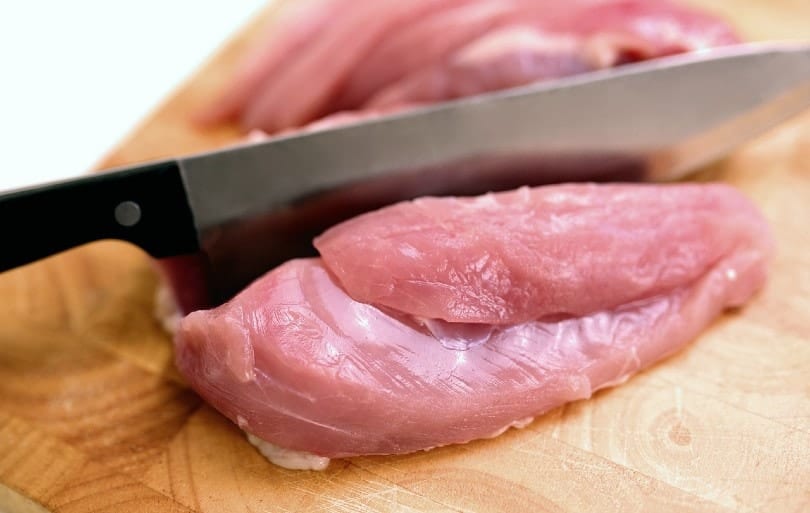
Also known as “salmonellosis,” salmonella is a bacteria that was first discovered in 1885 by Dr. Daniel E. Salmon. It affects the intestinal tract of humans and animals and is the leading cause of food poisoning in the U.S.A.
Most commonly, salmonella is found in raw or undercooked foods, and it can also be found in fruits, vegetables, and nuts if they’ve come into contact with the contagion. The most common foods to be contaminated are meat, eggs, unpasteurized dairy products, and seafood.
- Nausea
- Vomiting
- Diarrhea
- Fever
- Abdominal pain
- Headache
Can I Get Salmonella From My Backyard Chickens?
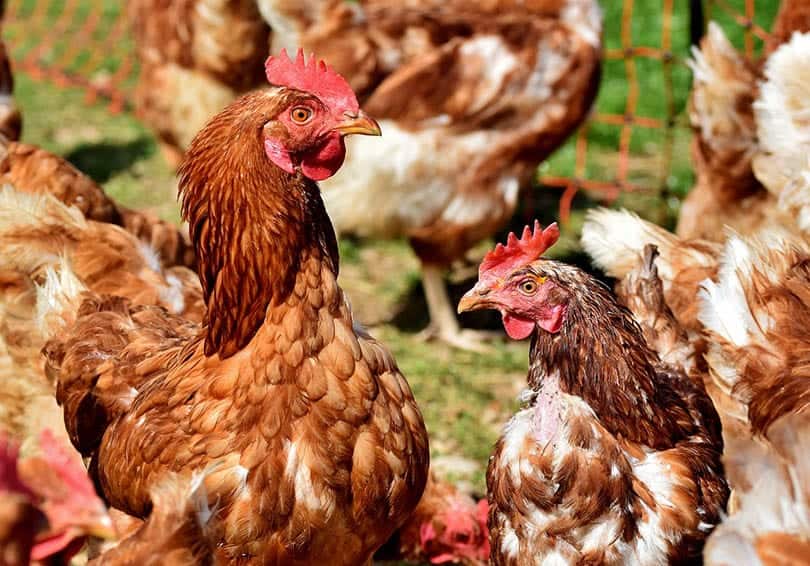
Chickens, ducks, and many other birds can be carriers of the salmonella bacteria. The germs might not affect them at all, and your backyard flock can pass on the bacteria while appearing to be completely healthy.
Although it’s not an airborne disease, salmonella is contagious. You can get salmonella from your chickens simply by handling the infected birds and touching your mouth afterward. Touching contaminated eggs, infected meat, or feces and then forgetting to wash your hands is another common cause of contracting the infection.
You can even get salmonella from infected chicks. If the hens are infected with the bacteria when they lay the eggs, they can pass it on to their offspring too.
How Do Chickens Get Salmonella?
Where there are chickens, you’ll find rodents. Both rats and mice love living in chicken coops because they’re warm and have free access to water and food. These rodents are a menace for several reasons. Not only do they steal your chicken food and eat their eggs, but they also carry salmonella in their feces and saliva.
Unfortunately, for your chickens, their uninvited guests also aren’t hygienic. They’ll spread their feces everywhere, from your chicken’s bedding in their nest boxes to their water and food dishes. Once your chickens come into contact with the infected feces, your healthy flock becomes carriers of salmonella too.

How to Protect Your Flock From Salmonella
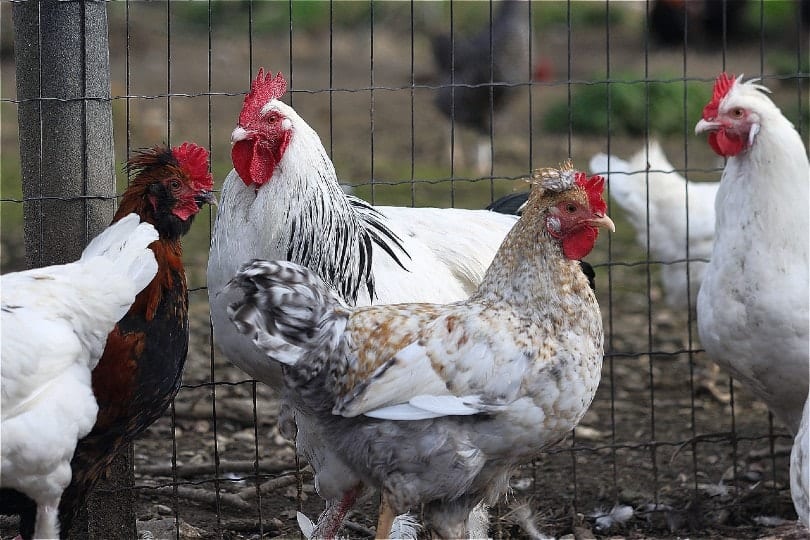
While it’s impossible to keep your chickens away from salmonella completely, you can protect your flock against the bacteria. Here are a few ways that you can protect your chickens from becoming carriers of salmonella.
Rodent-Proof Your Coop
Rats and mice are among the biggest causes of salmonella contamination among chickens. They like to loiter around areas with an abundance of food, and your coop is prime real estate. By rodent-proofing your coop, you can protect your flock, yourself, and your pets from salmonella.
Food and Water
The chicken food that you leave in your coop throughout the day and overnight is one of the biggest reasons that rats adore the space. By leaving trays of food on the ground, you’re not only giving rodents a free meal, but you’re also allowing them to leave feces in the chicken food.
Rodent-proofing your chicken’s food and water dishes is as simple as raising them off the ground by hanging them from the ceiling or using a feeder that rodents can’t get into. Make sure the food and water dishes are in easy reach of your chickens, though.
You can also avoid contaminated food dishes by only setting out enough food for mealtimes instead of leaving it out all day. With the food being less accessible, your coop will be less attractive to freeloaders.
Rodent-Proof Storage
Invest in sturdy plastic or metal storage bins for your chicken feed. While rodents and other animals can eat through the bags that the feed comes in, they’ll have more issues with sealed tubs. It’s a good idea to keep your feed storage away from your coop too and to clean up any spills as soon as possible.
Electronic Deterrents
You can buy ultrasonic deterrents that use sound waves to fend off rodents. They’re designed to use a frequency that rodents hate while being unobtrusive and not bothering your chickens or other pets.
Peppermint Oil or Mint Plants
As prey animals, rodents rely on their sense of smell. They dislike strong smells that hinder their ability to notice predators. Mint is one particular smell that they dislike. Try dropping peppermint oil around your coop or planting mint to help deter them.
Reputable Chicken Breeders
If you’re just starting your backyard flock, look for breeders who regularly test their stock for salmonella. By purchasing chickens that don’t already carry the bacteria, you’ll be able to prevent infecting the rest of your flock or starting with contaminated birds.
Keep Your Flock Healthy
Making sure your flock is as healthy as possible is one of the best ways to prevent infection. A strong, healthy immune system will help your chickens fight off infections.

How to Protect Yourself From Salmonella
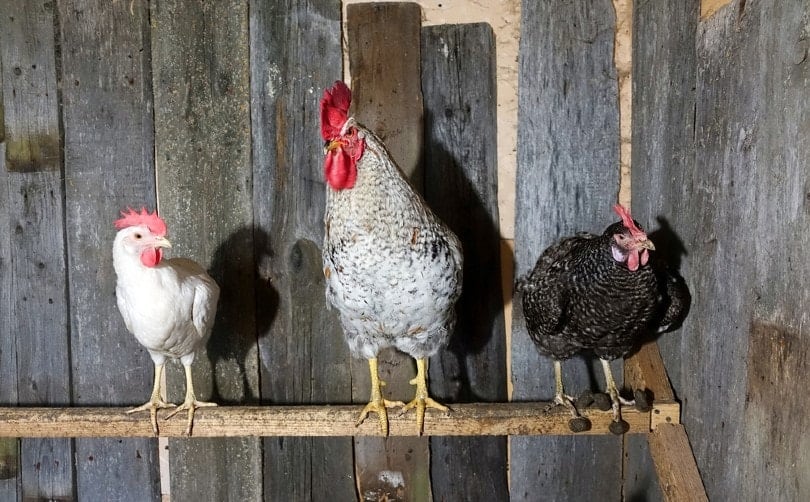
Even if you take measures to protect your flock, you should protect yourself from salmonella too. There’s no way to know whether the raw chicken or eggs that you’re handling are contaminated. Many chickens don’t show any signs of infection, and livestock can spread the contaminations just as easily as food products from them. Fortunately, protecting yourself and your family doesn’t take much work.
Wash Your Hands
Spreading salmonella is as easy as touching contaminated eggs, meat, or live chickens and then touching your mouth. Washing your hands for at least 20 seconds after handling anything that could be contaminated is one way to keep yourself safe.
Supervise Children Around Livestock
Children make up the highest number of cases of salmonella because they tend to touch everything around them and then put their fingers in their mouths. If you let them anywhere near livestock, whether chickens or other farm animals, make sure you keep an eye on them.
Teaching them about proper hygiene, especially around animals, will also help you minimize the risk of infection.
Be Careful When You Interact With Chickens
The way that you interact with your chickens also makes a difference in how likely you are to prevent infections from salmonella. Provided that you wash your hands afterward, hugging and petting your chickens is okay. Like with touching your face, however, kissing your chickens should be avoided. The same goes for eating food around your flock or the coop.
You shouldn’t let your chickens into your home. Keep chicks and sick chickens in spaces dedicated to them, like a brooder or a separate barn away from the main coop.
Practice Good Food Hygiene
Keeping your kitchen as clean and hygienic as possible will help reduce the risk of contracting salmonella. There are a few ways that you can do this:
- Keep raw meat away from other food.
- Use separate cutting boards for meat and vegetables.
- Make sure meat and eggs are cooked thoroughly.
- Use disposable towels to wipe down surfaces.
Regularly Test Your Flock
If you sell chickens or their eggs, it’s a good idea to get your flock tested for salmonella. Your veterinarian will be able to test them for you and prescribe antibiotics if the bacteria is present. Sage is also a good way to help control infections. You can add it to your chicken’s feed and put it in dishes that use their meat or eggs.

Conclusion
Many people don’t consider live chickens to be a threat when it comes to salmonella. So, it can be surprising to learn that you can get salmonella from your backyard flock, especially if they’ve come into contact with the bacteria from infected rat or mouse droppings.
Fortunately, there are plenty of ways to protect yourself and your chickens from salmonella. Practicing good hygiene around your flock will help you keep infections at bay.
Featured Image Credit: John Panella, Shutterstock
